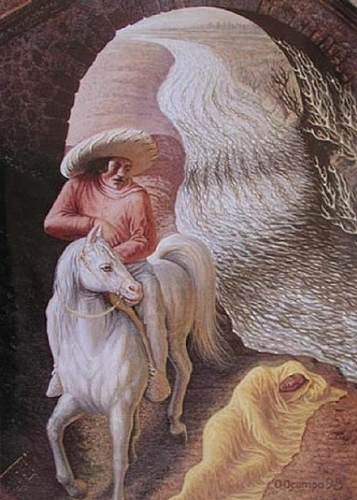The Question is Not What You Look at but What You See Easy
It's not what you look at that matters, it's what you see.
It's not what you look at that matters, it's what you see. – Henry David Thoreau

Do you see a face, or a man on a horse and a girl by a river? Did you even see the stone arch over the river?
What does that mean?
What do you see, or do you usually just look? It's only human to not see everything. There is just too much to see and process, so our minds delete that which it believes to be unnecessary. As an example, if you looked for everything in a room that was red, and then were asked to close your eyes and describe everything that was blue, what would happen?
That makes our selection of what we see even more important. Even when you carefully examine the same thing as another person, you might see something completely different. If the two of you were asked to describe what you saw, things could get interesting, right? Can you make allowances for others to see the same thing, but describe it differently?
Why is observation important?
It's easy to see that, even when we see the same thing, we don't all see things the same. It can be so much worse if you aren't paying close attention to what you are looking at. How often have do you get into arguments about something you looked at, but didn't see as well as you probably should have.
Sometimes the tiniest details hold a clue, or even the solution, to whatever you are working on. This isn't just a skill for Sherlock Holmes or a detective in a crime show. Subtle changes in someone's behavior might be your only clue that something is going on. With a teen in the house, you know I am working on sharpening my observational skills every day!
Where can I apply this in my life?
How often do you look at things, but not really see them? I imagine that if you were a passenger in a car being driven down a route you usually take as the driver, you would see many things you hadn't noticed as the driver. I know that to be the case with me.
When my wife drives, I get to look around and see all the details that I normally give little more than a quick look at as I drive by. Sometimes it can be amazing how the flowers change, as the different species bloom and fade. Each of the 'pretty' corners has a different feel as the year moves along. I know this, but I rarely see it while I'm driving, as my effort in seeing is devoted to keeping an eye on the road.
What do you look at on a regular basis, but don't always see? Perhaps a family member (or all of them), co-workers, or friends? Not just how they look, but what their needs are, what their wants and desires are, what they might be trying to tell you that you aren't noticing. While observation implies the use of your eyes, you must be careful not to miss other clues.
How can you improve your observation skills? I would start with easy things to do. Spend an afternoon looking for everything red around you, where ever you are. The next day, do the same with another color. If you were going to spend a long day driving, try to find all the blue two door cars, or people driving the same car as yours.
I would also make a list of the things I think would be important to notice in your average day. Perhaps separate lists for work, home, and friends might be more appropriate. Did anyone get new clothes? Did someone change their hair? Is someone more grumpy or sad than usual? Is the boss' car missing from it's usual place in the parking lot? These might or might not be important to you, but you can use them as a starting point for your own list.
Now that you have a list, start keeping track of how often you notice things. You can even turn it into a game, where you take a few moments to look for clues a few times a day, and record what you find. Be aware that there may be things you are missing, and revise the list as you get feedback from people about not noticing something they thought was important.
From: Twitter, @AR_Foundation
confirmed at : http://www.brainyquote.com/quotes/quotes/h/henrydavid106041.html
Photo by The Lex Talionis
Source: https://philosiblog.com/2012/02/10/its-not-what-you-look-at-that-matters-its-what-you-see/
0 Response to "The Question is Not What You Look at but What You See Easy"
Postar um comentário